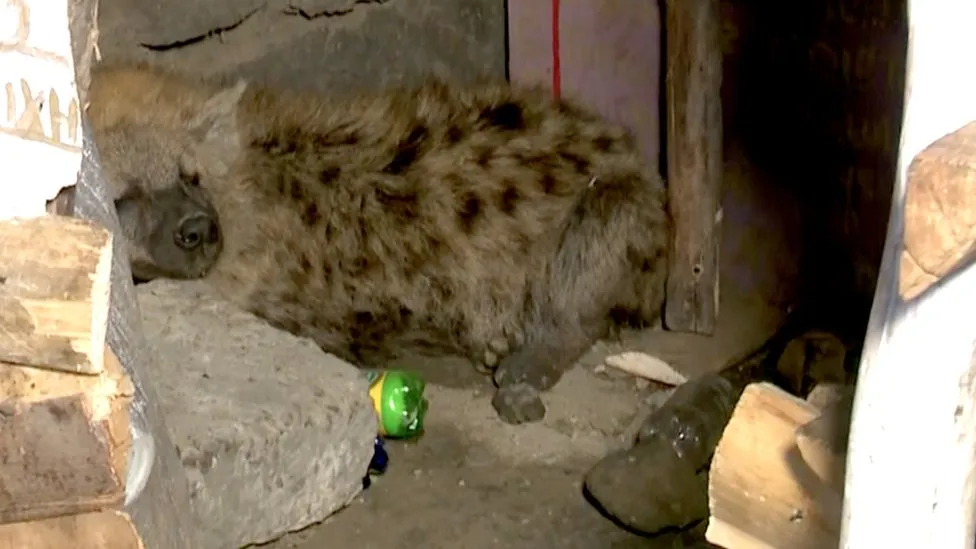A businessman in Kenya’s Rift Valley city of Nakuru was “shocked” when he turned up for work early on Wednesday to find a “strange animal” in his small shop.
Fredrick Omungu did not know what it was at first, but said he was scared.
“It clearly wasn’t a dog – I thought it was a leopard or something else.
Some neighbours came and identified the animal as a hyena, which under certain conditions can attack humans.
“I was shocked and stayed far away. I’ve heard hyenas are dangerous and can kill people,” Mr Omungu said.
In less than 30 minutes, dozens of residents had gathered around his stall to see the stranded animal hiding under the makeshift counter.
It is unclear how the animal ended up in his stall in a populated area.
Mr Omungu, who sells the leafy stimulant khat, which is known locally as miraa, as well as soft drinks, sweets and groundnuts, said he had closed his business at around 20:00 local time (17:00GMT) the previous night and had arrived at around 07:00 the following morning.
The area is not far from the Lake Nakuru National Park, where the hyena is suspected to have strayed from at night.
Wardens from the Kenya Wildlife Service (KWS) later came and captured the animal.
Conflicts between animals and humans are becoming increasingly common in Kenya and in recent times there have been reports of hyenas attacking people in different places across the country.
In Nakuru, some residents have blamed the KWS for not taking enough measures to stop the animals from crossing the park into public areas.
But Mark Cheruiyot, a senior KWS warden from the county, told the BBC the fence, which at times has been vandalised, was being upgraded and it was unfortunate that the animal had got out of the park.
Mr Omungu said he was worried for the safety of children at a nearby primary school that is even closer to the park than his shop.
“Some of these children get to school around 5am… I thank God that the hyena did not harm anyone,” he said.
Another Nakuru resident, Jacinta Njeri, told local media that it was not the first time that a hyena had been spotted in the area, saying people were afraid especially for their children.
Last month, Kenya’s Tourism Minister Alfred Mutua said the high number of hyena attacks on people and livestock in recent times was the result of the overpopulation of the mammals.
Animal health authorities confirmed three weeks ago that three hyenas that attacked and mauled people in different locations had been infected with rabies.
KWS said this would explain the unusual aggressive behaviour towards people.
It had earlier shared an alert advising people on how to behave when they encounter a hyena.
The advisory to “stand your ground” and “try not to show your fear, keep yourself calm by talking to it” sparked ridicule, with some asking what language people should use to talk to the creatures.
The criticism has persisted, especially as some of the recent attacks have resulted in deaths or injuries.
Last month KWS officers discovered the body parts of a victim of a hyena attack near the capital, Nairobi, close to an area where a university student had been attacked and bitten on the thumb.
In January, a 10-year-old boy was mauled to death on the outskirts of the capital.
